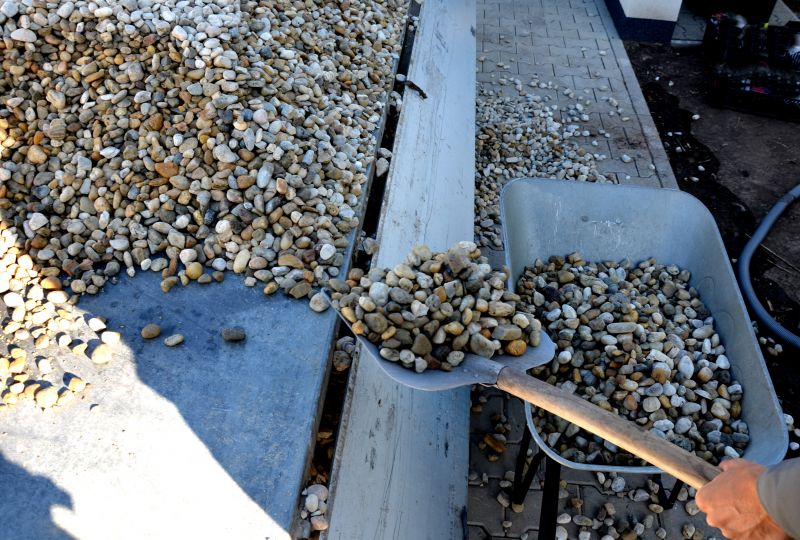Expert Picks for Bulk Rock Delivery Solutions for Large-Scale Projects
Find out which bulk rock delivery products professionals trust for efficiency, safety, and high-volume handling.
 Bulk rock deliveries are essential for a variety of construction, landscaping, and industrial projects. They provide a convenient way to acquire large quantities of materials such as gravel, crushed stone, sand, and other aggregate products. These materials are fundamental components for creating stable foundations, driveways, pathways, and decorative features. When planning for bulk rock deliveries, it is important to consider the specific type and size of the material needed, as well as the delivery logistics to ensure the project runs smoothly.
Bulk rock deliveries are essential for a variety of construction, landscaping, and industrial projects. They provide a convenient way to acquire large quantities of materials such as gravel, crushed stone, sand, and other aggregate products. These materials are fundamental components for creating stable foundations, driveways, pathways, and decorative features. When planning for bulk rock deliveries, it is important to consider the specific type and size of the material needed, as well as the delivery logistics to ensure the project runs smoothly.
Top Overall Option
Bulk Gravel and Crushed Stone
This versatile material is suitable for a wide range of applications including driveways, pathways, drainage systems, and foundation support. It is available in various sizes and types to match specific project needs, providing a reliable and consistent supply for bulk deliveries. Its ease of handling and compatibility with other construction materials make it a popular choice for many contractors and landscapers.
Types of Products For Bulk Rock Deliveries
Crushed Stone
A common aggregate used for construction and landscaping, available in various sizes for different applications.
Gravel
Rounded or angular gravel suitable for driveways, drainage, and decorative features.
Sand
Fine aggregate used for concrete mixes, mortar, and filling applications.
Pea Gravel
Small, rounded stones often used in landscaping and pathways for aesthetic appeal.
Limestone Chips
Crushed limestone suitable for driveways, pathways, and erosion control projects.
Basalt Rock
Dense, durable rock used for decorative purposes and heavy-duty construction.
Decomposed Granite
Fine aggregate ideal for pathways, patios, and decorative landscaping.
Recycled Concrete Aggregate
Crushed concrete suitable for fill, base material, and drainage applications.
Slate Chips
Thin, flat stones used for decorative landscaping and pathways.
River Rock
Smooth, rounded stones ideal for landscaping and decorative features.
Trap Rock
Hard, durable rock used in construction and industrial applications.
Dewatered Soil
Specialized soil used for landscaping and erosion control in bulk quantities.
Flagstone
Flat stones suitable for patios, walkways, and decorative surfaces.
Crushed Shells
Organic-looking aggregate used in landscaping and pathways.
Marble Chips
Decorative crushed marble used for aesthetic landscaping and pathways.
Quartz Gravel
Sparkling, durable gravel suitable for decorative purposes and pathways.
Granite Chips
Hard, angular stones used for landscaping and structural applications.
Popular Choices
Widely used for construction and landscaping projects, available in multiple sizes.
A versatile aggregate for driveways, drainage, and decorative features.
Commonly used for concrete, mortar, and filling applications in bulk quantities.
Popular for pathways and decorative landscaping projects.
Preferred for erosion control and driveway applications.
Favored for its smooth appearance in landscaping and decorative features.
Sustainable option for base layers and fill in construction projects.
Ideal for pathways and decorative landscaping in bulk orders.
Chosen for patios and walkways due to its flat, durable surface.
Durable and dense, suitable for heavy-duty landscaping and construction.
Popular in decorative landscaping and pathways for a natural look.
Used for aesthetic landscaping and decorative features.
Sparkling gravel favored for decorative pathways and garden beds.
Hard, angular stones suitable for structural and decorative purposes.
Choosing the right bulk rock product depends on the intended use. For example, larger stones are often used for drainage or erosion control, while finer materials like sand or small gravel are suitable for concrete mixes or fill. Delivery methods vary, with some suppliers offering large dump trucks or conveyor systems to efficiently unload materials. It is also crucial to verify the quality and consistency of the rocks to meet project specifications and avoid issues during application.
Proper planning and selection of the appropriate materials can significantly impact the success of a project. Consider factors such as the size and weight of the rocks, the compatibility with existing structures, and the ease of handling during installation. Whether for a small landscaping project or a large-scale construction site, having reliable access to bulk rock supplies ensures timely progress and cost efficiency. Consulting with suppliers about delivery options and material specifications can help tailor the solution to your specific needs.
Overall, bulk rock deliveries serve as a vital resource for many industries, offering flexibility and volume to meet diverse project requirements. By understanding the different types of materials available and what to look for when ordering, you can make informed decisions that support the durability and success of your project.
Key Buying Considerations
- Type of material suitable for your specific project needs
- Size and gradation of rocks or aggregates
- Quantity required to meet project scope
- Delivery options and scheduling flexibility
- Cost per volume or weight for budgeting purposes
- Compatibility of the material with existing structures or surfaces
- Ease of handling and installation logistics
- Quality and consistency of the material supplied
- Availability of different grades or sizes
- Potential need for additional processing or screening
- Supplier reputation and reliability
- Local regulations or restrictions on certain materials
- Potential for contamination or impurities in bulk materials
- Storage requirements at the delivery site
- Environmental considerations, if any, related to material sourcing
